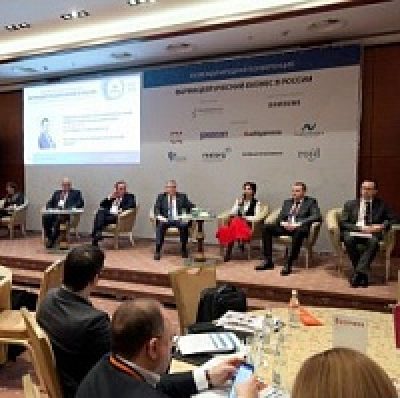From a loyalty to a patient to patient’s loyalty
On 20th of February, the representatives of the pharmaceutical business, the Healthcare system and regulatory authorities met at the Radisson Royal Hotel in Moscow for the first «Pharmaceutical Business in Russia – 2018» conference this year to discuss the current issues of the industry and the possibilities of the pharmaceutical market development this year.
Meetings season of the pharmaceutical industry representatives has started. Traditionally, the professionals gathered together for the 13th time, who are involved to the topic. In front of the audience more than 60 speakers, including heads of ministries and departments, have performed.
«The share of Russian vital and essential medicines has increased by 10% in monetary value over the last five years», a Deputy Minister of Industry and Trade of the Russian Federation, Sergei Tsyb said during his speech. In addition, at the conference the audience became aware that the Ministry of Industry and Trade has begun to discuss the program «Pharma 2030», which gives hope for the future development of the industry. Nevertheless, there were more than enough of sensitive issues for discussion. General Director of the ARPM, Viktor Dmitriev, speaking at the plenary session, noted that: «until now, there is no an overarching goal, national policy and there is no a single regulator of the market, what impedes the development of the industry. Everyone comes with his own initiative, declaring that it will be able to solve the issue». In fact, the paradoxes appear. In the state register there was information about the interchangeability of medicines, but not all of them turned out to be so. «There are both a medical and a legal issues», the General Director of the ARPM commented the situation – «a medicine is legally registered, a doctor has the right to prescribe it, the supplier comes out with this medicine for bidding and it turns out that the medicine is not interchangeable. How to solve this situation is not clear». According to Victor Dmitriev, the industry associations applied to FSBI «Scientific Centre for Expert Evaluation of Medicinal Products» of the Ministry of Health of the Russian Federation with a request to organize a working meeting to discuss this issue.
The question of possible trade of medicines in grocery stores, which has been discussed for a long time, was not ignored. «The problem is not whether you can sell medicines in a store or not. The main issue is the possibility of selling without a license. And in this context it is necessary to understand what is the future of the pharmacies, that can not to sustain the competition, how we can provide medicines to rural and remote areas, how much does the prescription drugs will cost» — Viktor Dmitriev has noted.
The program of the conference was extremely diverse and each of the speakers had a chance to speak about the prospects of the market. Oleg Astafurov, a managing business development partner of «Pharmasynthes» noted that, despite the external factors, «the pharmaceutical market is growing, companies are increasing the number of employees, salaries are rising. We are glad of our results. Over the last year, we have grown by 30%. It seems to us that the development of the market is moving to the right direction».
In addition, the topic of the implementation of GMP-standards was discussed. Thus, according to Anna Jarwitz, a senior vice president, a head of the cluster Teva Russia and Eurasia and General Director Teva Russia: «In 2017 we tested ourselves for strength. GMP commissions actively inspected our plants. We proudly passed this exam».
A separate session under the moderation of the Head of the ARPM Viktor Dmitriev was devoted to the issues of interaction of law and business in the pharmaceutical industry and regulation of pricing.
Opening the meeting, Viktor Dmitriev noted that «pricing issue is the cornerstone. Many manufacturers have decided regarding attitude to the special investing contract as a mechanism of government support. But the vagueness of the wording still repels many potential project participants».
Oksana Monzh, a General Manager of the prescription unit «Sanofi» in Russia, mentioned: «Our attitude to the SPIC is positive, but this tool, of course, needs to be improved».
According to the General Director of Novartis Pharma, Natalia Kolerova: «The company’s plant had started working when there was no SPIC system yet. Novartis was one of those who responded to the call of the Russian government to build and invest in manufacturing. Those ideas that had been discussed were not put into practice in a practical regulatory system and this affected the business model. Now we are thinking how to proceed».
The conference has not been without some pleasant surprises: on the opening day, an Agreement of cooperation between the Association of the Russian Pharmaceutical Manufacturers and the Russian Association of Pharmacy Chains was signed. «One of the main tasks of this event is to solve the issues of "overflow". The issue is not simple, it has legal and ethical nuances, but we are aimed at the joint solution of these objectives», — Victor Dmitriev, a General Director of the ARPM emphasized.

